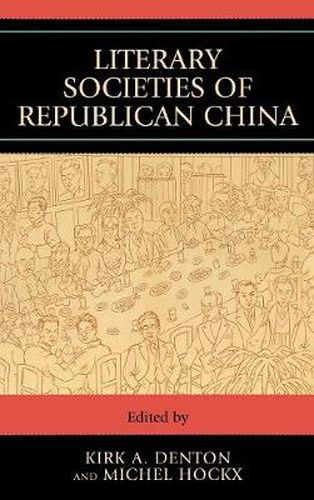Readings Newsletter
Become a Readings Member to make your shopping experience even easier.
Sign in or sign up for free!
You’re not far away from qualifying for FREE standard shipping within Australia
You’ve qualified for FREE standard shipping within Australia
The cart is loading…






Literary Societies in Republican China provides a new and comprehensive perspective on the fascinating literary world of the most turbulent period in recent Chinese history: the Republican era of 1911-1949. Wedged between the fall of the Empire and the founding of the Communist state, the Republican period witnessed enormous social, political, and cultural changes. Traditionally the period is seen as one of transition: from the country being partially colonized and occupied to being an independent nation-state, from Confucianism to socialism, from writing in classical Chinese to writing in the everyday vernacular. Modern scholarship, however, has become suspicious of such attempts to analyze history, including cultural history, as a journey from A to B via C. Instead, attention has turned to the thick description of complex historical phenomena without worrying about whether or not they fit into some neat linear scheme. Inevitably, such scholarship benefits from collaboration and teamwork, from the juxtaposition of different insights and different materials in order to gain in overall breadth. Literary Societies in Republican China represents such teamwork and such breadth. The thirteen essays by eleven scholars from North America, Europe, and Asia present detailed discussions of particular literary groups active on the Republican-era literary scene. Some of these groups are familiar representatives of what used to be considered the mainstream, while others represent literary styles that have hitherto been considered marginal or that have been ignored altogether. Each of the essays in this volume looks in detail at literary societies both as producers of literary views and texts and as organizations with sometimes very complex social structures. The result is a unique blend of literary, cultural, and social history, unrivalled in any English-language scholarship on China to date.
$9.00 standard shipping within Australia
FREE standard shipping within Australia for orders over $100.00
Express & International shipping calculated at checkout
Literary Societies in Republican China provides a new and comprehensive perspective on the fascinating literary world of the most turbulent period in recent Chinese history: the Republican era of 1911-1949. Wedged between the fall of the Empire and the founding of the Communist state, the Republican period witnessed enormous social, political, and cultural changes. Traditionally the period is seen as one of transition: from the country being partially colonized and occupied to being an independent nation-state, from Confucianism to socialism, from writing in classical Chinese to writing in the everyday vernacular. Modern scholarship, however, has become suspicious of such attempts to analyze history, including cultural history, as a journey from A to B via C. Instead, attention has turned to the thick description of complex historical phenomena without worrying about whether or not they fit into some neat linear scheme. Inevitably, such scholarship benefits from collaboration and teamwork, from the juxtaposition of different insights and different materials in order to gain in overall breadth. Literary Societies in Republican China represents such teamwork and such breadth. The thirteen essays by eleven scholars from North America, Europe, and Asia present detailed discussions of particular literary groups active on the Republican-era literary scene. Some of these groups are familiar representatives of what used to be considered the mainstream, while others represent literary styles that have hitherto been considered marginal or that have been ignored altogether. Each of the essays in this volume looks in detail at literary societies both as producers of literary views and texts and as organizations with sometimes very complex social structures. The result is a unique blend of literary, cultural, and social history, unrivalled in any English-language scholarship on China to date.